Adaptive sports offer powerful mental health benefits beyond physical activity. You’ll experience improved self-confidence (89% of participants report increases), reduced depression and anxiety, and stronger social connections (94% feel genuine belonging). These activities transform your self-image from limitation-focused to capability-centered while releasing mood-boosting endorphins. Weekly goal-setting creates measurable achievements that extend into daily life. The combination of community support, skill development, and emotional resilience creates a thorough approach to mental wellness worth exploring further.
What Mental Health Advantages Come From Adaptive Sports?
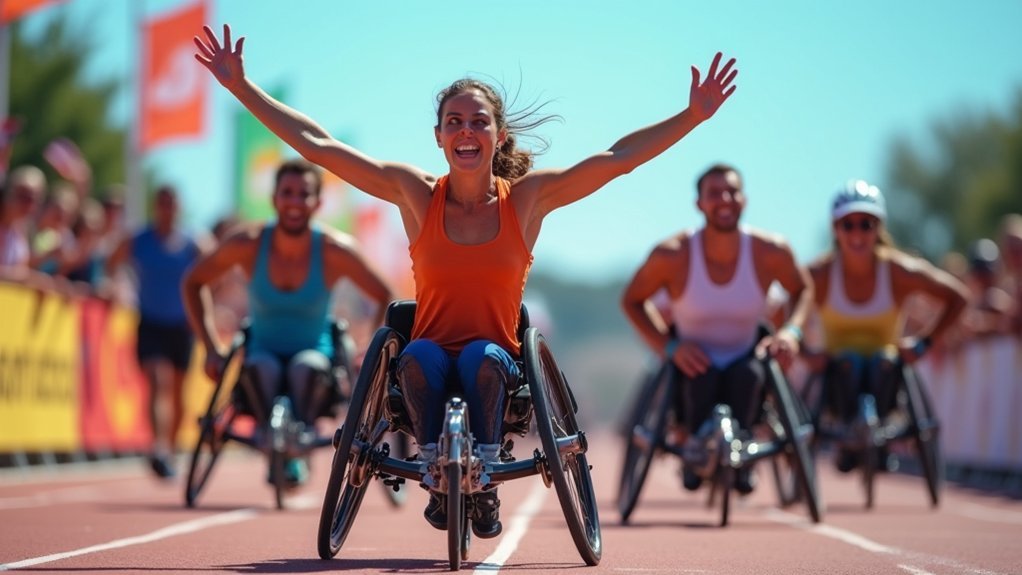
While physical benefits of adaptive sports are often highlighted, their mental health advantages are equally profound and life-changing. Nearly 90% of participants report improved overall mental health, with significant reductions in depression and anxiety symptoms.
You’ll experience a stronger sense of belonging as part of an adaptive sports community, with 94% of athletes feeling more connected to others. This connection combats isolation and builds mental resilience through consistent emotional support from teammates and coaches.
These activities also boost self-esteem dramatically – 89% of participants report enhanced confidence after achieving personal goals in their chosen sport.
The combination of physical achievement, community connection, and emotional support creates a powerful foundation for mental wellness that extends well beyond the playing field.
Building Self-Confidence Through Adaptive Achievement
You’ll discover newfound confidence when you master adaptive sports challenges that once seemed impossible.
Each small victory, from paddling a kayak solo to reaching a climbing hold, reshapes what you believe is possible for yourself.
Your personal limits expand with every achievement, supported by the 89.47% of adaptive sports participants who report increased self-confidence through their journey.
Mastering New Challenges
When individuals with disabilities conquer new physical challenges through adaptive sports, they access a powerful pathway to enhanced self-confidence. The statistics reveal this transformation—89% of participants report improved self-esteem through mastering new skills in activities like rock climbing and kayaking.
You’ll experience a profound sense of accomplishment when achieving what you once thought impossible. Weekly goal setting, as demonstrated by participants like Ty, creates measurable progress that reinforces your growing capabilities. This approach transforms “I can’t” thinking into “How can I?” problem-solving.
The emotional support from the adaptive sports community amplifies these benefits. When you’re surrounded by others who understand your journey, feelings of isolation diminish, further strengthening your confidence and creating a positive cycle of growth and achievement.
Celebrating Small Victories
Celebrating incremental progress forms the foundation of sustained self-confidence in adaptive sports. Nearly 90% of students report increased confidence from these small victories, transforming their self-perception through each achievement. When you accomplish modest goals, like Ty did, you’re building a stronger self-esteem that extends beyond physical activity.
The power of celebrating small victories is magnified by the community around you. With 94% of participants experiencing a greater sense of belonging, you’ll find emotional support that reinforces your newfound confidence. This supportive environment helps shift your mindset from limitations to possibilities—from “I can’t” to “How can I?”
These confidence gains contribute considerably to your overall mental health, creating a positive cycle where each small triumph prepares you for life’s broader challenges.
Redefining Personal Limits
Adaptive sports fundamentally redefine what you believe is possible, challenging the boundaries you once thought immovable. The transformation is significant—nearly 90% of participants report increased confidence after discovering capabilities they never imagined existed.
When you set and achieve weekly goals like Ty does, you’re not just playing sports—you’re rebuilding your self-concept. The mental health benefits extend beyond the playing field as you shift from “I can’t” to “How can I?”
Brandon’s story exemplifies this mindset revolution, accomplishing feats previously deemed impossible. This sense of accomplishment carries into daily life, with veterans reporting enhanced adaptability in everyday challenges.
Your participation in adaptive sports doesn’t just improve physical abilities—it reconstructs your understanding of personal potential, creating lasting mental resilience through achievement.
Breaking the Isolation Barrier: Social Connection in Adaptive Sports
For many individuals with disabilities, social isolation can pose as significant a challenge as physical limitations themselves. When you participate in adaptive sports, you’ll join a thriving network where 94% of participants report feeling a genuine sense of belonging, according to Move United surveys.
These social connections directly combat feelings of isolation through meaningful interactions with others who understand your experiences. You’ll develop improved communication and social skills—a benefit reported by over 63% of Maine Adaptive participants.
The supportive community creates natural opportunities for building friendships and emotional support networks that extend beyond athletic activities. Organizations that promote adaptive sports intentionally create inclusive spaces where you can form connections that contribute to your mental well-being, proving that the value of participation extends far beyond physical activity alone.
Stress Reduction and Mood Enhancement Through Physical Activity
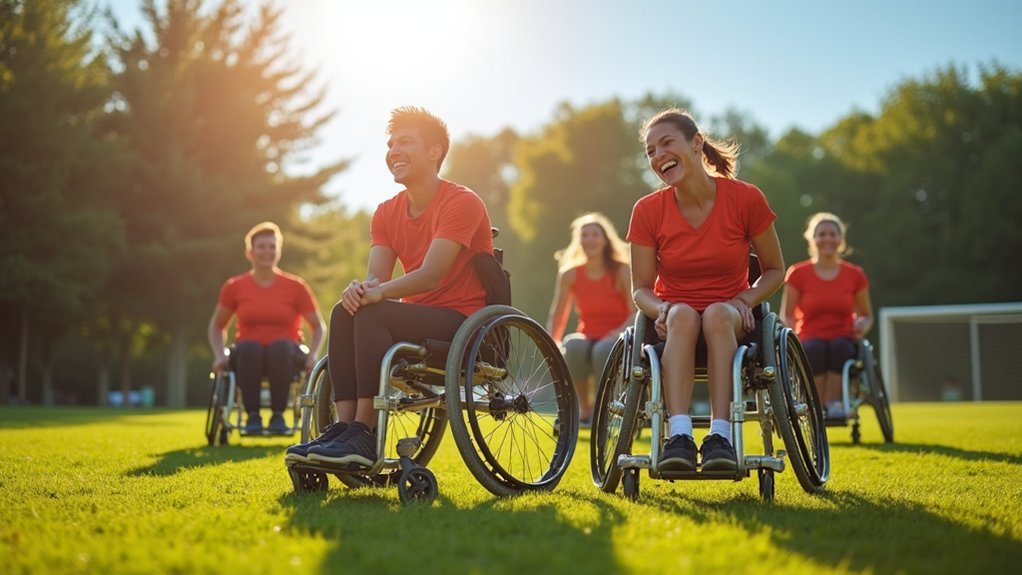
When you participate in adaptive sports, your body releases endorphins that naturally combat stress and elevate your mood throughout the day.
You’ll experience the powerful mind-body connection as physical activity helps manage stress levels while providing a constructive outlet for negative emotions.
Your engagement in adaptive sports serves as an active strategy for anxiety reduction, offering you a focused, purposeful way to channel nervous energy into positive physical achievements.
Endorphin Release Benefits
Physical exertion through adaptive sports triggers a powerful biochemical reaction that transforms both body and mind. When you participate regularly in adaptive sports, your brain releases endorphins—natural mood-enhancing chemicals that effectively combat stress and anxiety.
These “feel-good” hormones create a natural high that can greatly improve your mental health.
You’ll likely notice improvements beyond just mood elevation. About 89% of adaptive sports participants report developing a more positive self-image and increased self-esteem through their activities. As you achieve personal goals, you’ll experience a genuine sense of accomplishment that further enhances these benefits.
The community support inherent in adaptive sports environments adds another layer of protection for your mental wellbeing, building emotional resilience and reducing feelings of isolation that often accompany stress and anxiety.
Mind-Body Stress Management
By integrating movement with mindfulness, adaptive sports create a powerful stress management system for both body and mind. When you participate in these activities, you’re not just exercising your body—you’re giving your mental health a significant boost. Studies show that 84.17% of participants experience improved overall quality of life through adaptive sports.
| Stress Management Benefit | Mental Health Impact | Community Connection |
|---|---|---|
| Endorphin release | Reduced depression | Group support system |
| Focused attention | Decreased anxiety | Shared experiences |
| Goal achievement | Enhanced self-esteem | Belonging sensation |
| Physical relaxation | Improved resilience | Social integration |
You’ll find that regular participation helps shift your mindset toward challenges, making everyday stressors more manageable. The combination of physical activity and community support creates a thorough approach to managing stress.
Active Anxiety Reduction
Unlike traditional therapeutic approaches, adaptive sports offer a dynamic pathway to anxiety relief through purposeful movement and achievement.
When you participate regularly, you’ll experience a significant reduction in anxiety and depression symptoms, directly enhancing your mental well-being.
Physical activity naturally boosts your mood—89% of adaptive sports participants report improved self-esteem and self-confidence.
As you set and achieve personal goals, you’ll develop a more positive self-image, building mental resilience against anxiety.
The structured environment provides valuable emotional support while diminishing feelings of isolation.
You’ll find the camaraderie and shared experiences within the adaptive sports community foster a profound sense of belonging.
These connections reduce stress and create a healthier emotional state, making adaptive sports a powerful tool for active anxiety reduction.
Developing Resilience: Overcoming Challenges in Adaptive Sports
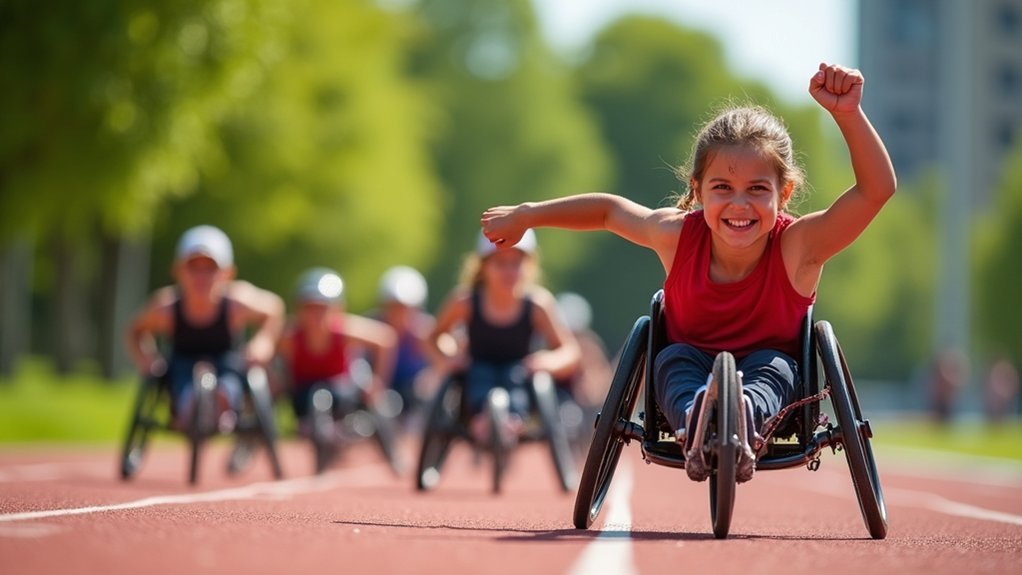
While facing physical limitations can often lead to feelings of helplessness, adaptive sports transform this mindset into one of empowerment and possibility.
You’ll experience a powerful cognitive shift from “I can’t” to “How can I?” as you engage with challenges in adaptive sports, building resilience that extends beyond physical activities.
The statistics speak volumes—90% of veterans in adaptive sports programs rediscover their competitive spirit, helping them overcome personal obstacles.
Weekly goal-setting activities enhance your sense of accomplishment as you tackle progressively difficult challenges.
Perhaps most importantly, you’ll gain coping mechanisms through the emotional support of a community that understands your journey.
This connection reduces isolation while teaching adaptability skills that you’ll apply to everyday situations, making resilience a transferable strength in all areas of life.
Identity Transformation: From Disability-Focused to Athlete-Focused
You’ll experience a profound shift in self-perception when adaptive sports reframe your identity from disability-centered to athlete-focused.
This transformation empowers you to build narratives centered on capability and achievement, evidenced by the 90% of veterans who developed a “how can I” mindset through sports participation.
The athletic identity you develop doesn’t just exist on the field or court—it permeates your daily life, contributing to the significant improvements in self-esteem reported by nearly 90% of participants.
Redefining Personal Narratives
How profoundly does one’s identity shift when athletic achievement becomes the focal point rather than disability? You’ll find that redefining personal narratives occurs when you shift from “I can’t” to “How can I?” The statistics are compelling—89% of adaptive sports participants report improved self-esteem and self-confidence, fundamentally reshaping their identities.
| Identity Component | Before Adaptive Sports | After Participation |
|---|---|---|
| Self-Perception | Disability-focused | Athlete-focused |
| Community Connection | Often isolated | 94% feel belonging |
| Daily Approach | Limitation-oriented | Capability-centered |
| Resilience | Limited | 90% of veterans renewed |
| Self-Talk | “I can’t because…” | “How can I…” |
This transformation isn’t merely psychological—it creates practical adaptability that transfers to daily life, helping you recognize and celebrate your capabilities rather than limitations.
Sports’ Identity-Shaping Power
The transformative journey from viewing oneself as a person with limitations to identifying as a competitive athlete represents one of adaptive sports’ most profound mental health benefits.
When you participate in these programs, you’re not just playing a game—you’re reshaping how you see yourself.
Sports provide an identity-focused shift that’s evident in the numbers: 90% of veterans report renewed competitiveness, while over 89% of participants experience improved self-esteem and self-confidence.
You’ll find yourself defined by achievements rather than limitations.
The emotional support from the adaptive sports community greatly reduces isolation, helping you build meaningful connections while embracing your athlete identity.
With 84.17% of students reporting better quality of life, these activities don’t just change what you can do—they transform who you believe you are.
Managing Anxiety and Depression Through Regular Participation
For individuals living with anxiety and depression, adaptive sports offer a powerful pathway to improved mental wellness beyond traditional treatments. When you participate in adaptive sports regularly, you’re not just getting physical exercise—you’re actively managing anxiety and reducing depressive symptoms.
The data speaks volumes: 89% of participants report improved self-esteem and self-confidence through their involvement.
The community aspect shouldn’t be underestimated either. With 94% of participants feeling more connected to their community, you’ll find that the isolation often accompanying mental health challenges diminishes considerably.
As you achieve personal goals through adaptive sports, you’ll develop a more positive self-image and gain emotional support from peers facing similar challenges. This combination creates a sustainable approach to mental health management that works alongside traditional treatments.
The Empowerment Effect: Regaining Control and Independence
Empowerment stands at the core of what makes adaptive sports so transformative for mental health. When you participate in these activities, you’re not just exercising—you’re reclaiming your independence and building resilience.
Statistics show that 89% of participants experience improved self-confidence, while 72% report greater independence in their daily lives.
- You’ll shift from “I can’t” thinking to a problem-solving mindset of “How can I?”—a powerful cognitive transformation.
- You’ll develop practical skills that transfer directly to everyday challenges, enhancing your self-sufficiency.
- You’ll connect with a supportive community that validates your experiences while pushing you to grow stronger.
Through adaptive sports, you’re not defined by limitations but empowered by possibilities, creating a foundation for improved mental health and a renewed sense of control over your life.
Community Support and Peer Mentorship Benefits
While reclaiming independence transforms individual capability, belonging to a supportive community amplifies this personal growth tremendously.
When you join adaptive sports programs, you’ll experience powerful emotional support from a community that understands your journey—94% of participants report an enhanced sense of belonging that directly combats isolation.
Peer mentorship becomes a cornerstone of your experience, with 72% of participants noting improved independence in daily life through teammate support.
You’ll develop stronger communication skills and meaningful friendships through team activities that promote collaboration. The shared challenges create a supportive network that helps you overcome mental health struggles while boosting your self-esteem.
Volunteers play an essential role in your journey too, enhancing your experiences and achievements while contributing greatly to your mental well-being and sense of accomplishment.
Mindfulness and Present-Moment Focus in Adaptive Sports
When you’re immersed in adaptive sports, your mind naturally shifts into a state of heightened awareness that transcends ordinary consciousness. This mindfulness allows you to focus on your body’s movements rather than external stressors, markedly improving your mental well-being and reducing anxiety.
The structured nature of adaptive sports cultivates present-moment engagement through:
- Goal-setting and skill development that creates a sense of accomplishment and positive mindset
- Enhanced emotional regulation as you become more aware of your body and surroundings
- Team camaraderie that establishes a safe environment for shared mindful experiences
You’ll find your self-esteem growing as you overcome challenges in this supportive setting. The mindfulness skills you develop during adaptive sports often extend into everyday life, creating lasting mental health benefits.
Goal Setting and Achievement: A Pathway to Mental Strength
Setting meaningful goals within adaptive sports creates a powerful framework for developing mental strength that extends far beyond the playing field. When you participate regularly, you’ll experience a profound mindset shift from “I can’t” to “How can I,” enhancing your mental resilience.
| Benefits of Goal Setting | Impact on Participants |
|---|---|
| Enhanced Self-Esteem | 89.47% reported improvement |
| Improved Quality of Life | 84.17% noted positive changes |
| Greater Adaptability | Develops “How can I” mindset |
Weekly goal setting leads to measurable achievements, as seen with Ty, who found pride in reaching personal milestones like kayaking and climbing. The supportive community of volunteers and fellow athletes bolsters your confidence as you set and accomplish objectives, contributing considerably to your overall quality of life and emotional well-being.
The Neurochemical Boost: Endorphins and Adaptive Sports
Nearly every adaptive sport participant experiences a powerful surge of endorphins during physical activity, creating a natural high that combats depression and anxiety. When you engage in adaptive sports, your brain releases these “feel-good” chemicals that dramatically improve your mental health and emotional well-being.
- Your self-esteem receives a significant boost, with 89% of participants reporting enhanced self-confidence through regular participation.
- Your cognitive functions sharpen, improving your focus and problem-solving abilities thanks to the neurochemical benefits.
- Your social connections strengthen, reducing isolation as you build relationships with teammates and competitors.
These neurochemical changes aren’t just temporary mood lifters—they create lasting improvements in your mental resilience and overall outlook, making adaptive sports a powerful tool for psychological wellness.
Frequently Asked Questions
What Are the Benefits of Adaptive Sports?
You’ll gain improved confidence, self-esteem, and emotional resilience through adaptive sports. They’ll connect you to a supportive community, help you achieve personal goals, and greatly boost your overall mental health and quality of life.
What Is the Positive Effects of Sports on Mental Health?
Participating in sports boosts your mental health by reducing depression and anxiety, improving self-esteem, fostering social connections, increasing emotional resilience, and creating a positive mindset. You’ll feel more confident and less isolated.
Which Sport Is Best for Mental Health?
The “best” sport depends on your preferences. You’ll find mental health benefits in activities you enjoy—whether it’s swimming for relaxation, running for endorphins, or team sports for social connection. Choose what energizes you.
How Playing Team Sports Can Improve a Person’s Mental Health?
Team sports boost your mental health by creating strong social bonds, enhancing self-confidence, reducing depression symptoms, improving communication skills, and building resilience through shared goals and achievements with teammates.
In Summary
By participating in adaptive sports, you’ll gain far more than physical benefits. You’ll build confidence, forge meaningful connections, and develop resilience that extends beyond the playing field. You’re not just strengthening your body—you’re nurturing your mind through stress reduction, mindfulness practice, and the natural mood boost from physical activity. The supportive community and sense of achievement you’ll find create a powerful foundation for lasting mental wellbeing.

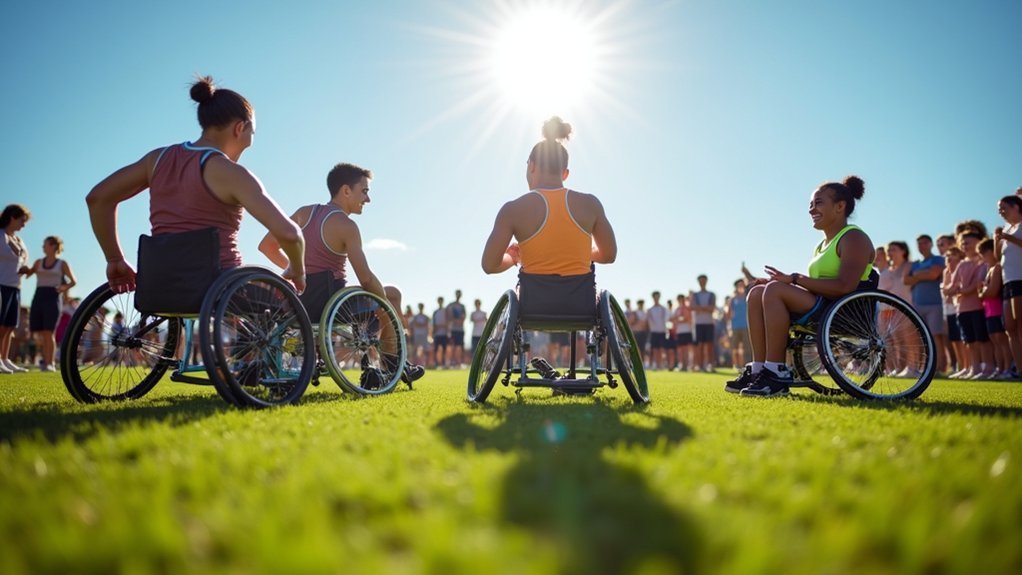
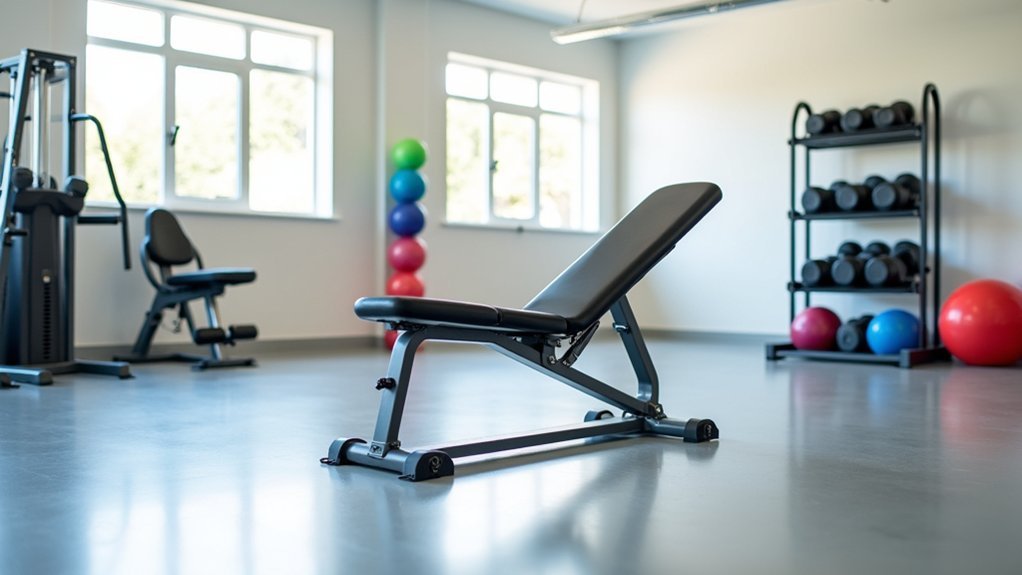
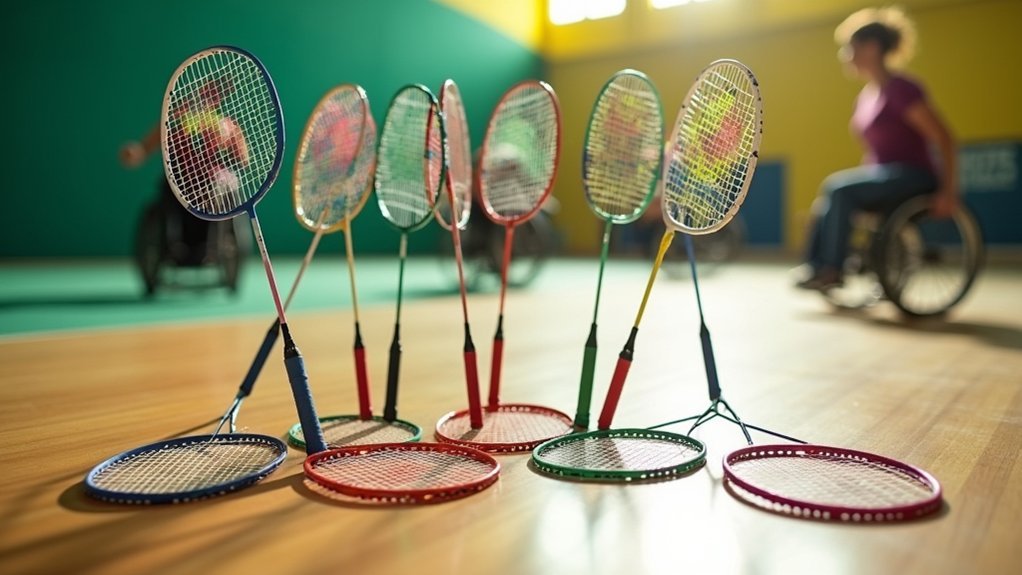
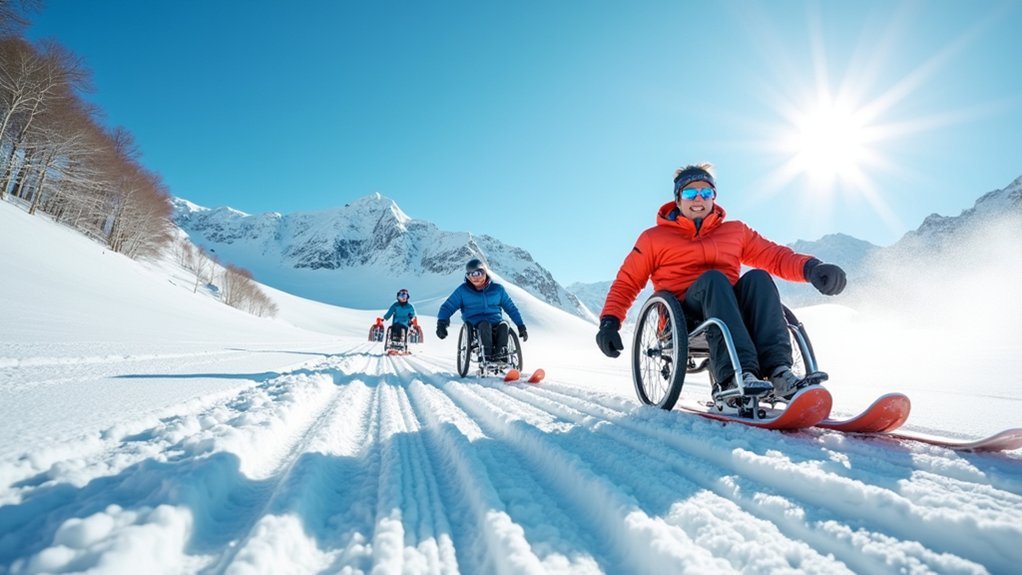
Leave a Reply